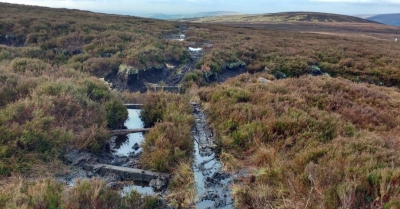Substantial cuts in global greenhouse gas emissions could be achieved by raising water levels in agricultural peatlands, according to a new study in the journal Nature.
Peatlands, such as those found in the Peak District, occupy just three percent of the world’s land surface area but store a similar amount of carbon to all terrestrial vegetation, as well as supporting unique biodiversity.
In their natural state, they can mitigate climate change by continuously removing CO2 from the atmosphere and storing it securely under waterlogged conditions for thousands of years.
But many peatland areas have been substantially modified by human activity, including drainage for agriculture and forest plantations.
In the UK more than 94% of peatlands have been damaged and are at a greater risk than tropical rainforests.
This results in the release of the equivalent of around 1.5 billion tonnes of CO2 into the atmosphere each year – which equates to three percent of all global greenhouse gas emissions caused by human activities.
A team of scientists, led by the UK Centre for Ecology and Hydrology (UKCEH), and including experts from the Universities of Birmingham and Leicester, estimated the potential reduction in emissions by restoring all global agricultural peatlands.
However, because large populations rely on these areas for their livelihoods, it may not be realistic to expect all agricultural peatlands to be fully rewetted and returned to their natural condition in the near future.
The team therefore also analysed the impact of halving current drainage depths in croplands and grasslands on peat – which cover over 250,000km2 globally – and showed that this could still bring significant benefits for climate change mitigation.
The study estimates this could cut emissions by around 500 million tonnes of CO2 a year, which equates to 1 percent of all global emissions caused by human activities.
The scientists say potential reductions in greenhouse gases from halving the drainage depth in agricultural peatlands are likely to be greater than estimated, given they did not include changes in emissions of the GHG nitrous oxide (N2O) which, like levels of CO2, are also likely to be higher in deep-drained agricultural peatlands.
Professor Vincent Gauci of the University of Birmingham, said:
Our findings show that in altering only one variable, raising the water table, it is possible to avoid greenhouse gas emissions from managed peatlands. The challenge then comes with adopting appropriate crops to maintain livelihoods.
In deforested peatlands, such as those in the tropics, this may mean planting more water-tolerant, but still useful trees that may more closely resemble those of the original peat swamp landscape.
For the latest on our region, subscribe to Midlands Matters, the official newsletter of the Midlands Engine.




